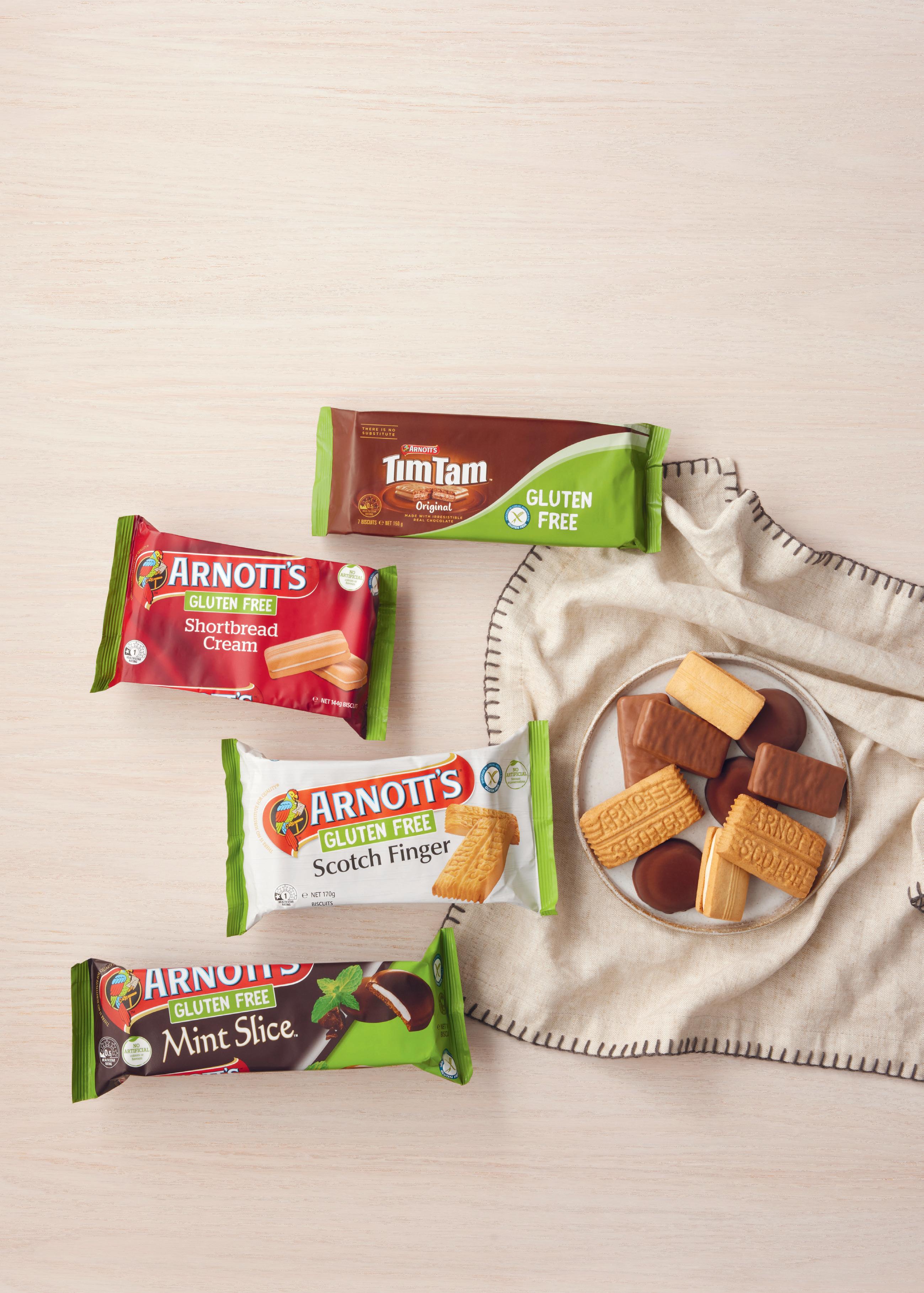CARING ABOUT PEOPLE with COELIAC DISEASE
EDUCATION
Have conversations about coeliac disease with your team
Promote wellbeing
Coeliac Disease is a permanent intestinal reaction to dietary gluten –a protein found in wheat, barley, rye and (avenin) in oats. Once diagnosed with coeliac disease, the treatment is adherence to a strict gluten-free diet for life. Talk to your health professional for advice Coeliac
Provide resources on how to cater for people with coeliac disease
KNOWLEDGE
ADVOCACY
Make changes to ensure colleagues with coeliac disease are included. Be aware of cross contamination, how this could affect someone at work, not only physically if they're glutened but also mentally if they are excluded


OUR VISION
That people with coeliac disease live healthy lives every day
Contact
Coeliac New Zealand PO Box 9734 Newmarket, Auckland 1149 admin@coeliac.org.nz | coeliac.org.nz
Medical Advisory Panel
Gastroenterologists: Prof Andrew Day MB ChB MD FRACP AGAF; Dr Kamran Rostami MD PhD; Dr Jonathan Bishop MB ChB 1995 Edin, MRCPCH 1999 CCT (UK) Paeds 2008, FRACP 2013; Specialists: Associate Prof Kirsten Coppell MB ChB, FNZCPHM MPH DipObs (Otago); Dr Richard H Steele MB Chb (University of Otago) 1989 FRACP (2000) FRCPA (2000).
Dietitians: Professor Clare Wall BSc (UK) PhD, New Zealand Registered Dietitian; Anna Richards, New Zealand Registered Dietitian; Sylvia North MSc (Nutrition and Dietetics), BSc (Nutrition and Physiology) New Zealand Registered Dietitian; Sophie Hall, New Zealand Registered Dietitian.
Currently on leave: Dr Kristin Kenrick BMedSci MB ChB DipObs FRNZCGP; Miriam Mullard MSc Dietetics (London) BSc Hons Human Nutrition (London) BSc Geography and Psychology (Auckland).
Patron: Dr Bob Anderson MBChB, BMedSci, PhD FRACP AGAF Gastroenterologist and Consultant. Honorary Patron: Dr Simon Chin MB ChB 1978 (Otago), Dip Obst 1984 (Auckland) DCH 1985 (Otago) FRACP 1991 Gastroenterologist, Paediatric Gastroenterologist.
Editor and advertising enquiries
Dana Alexander +64 9 414 7467 dana@coeliac.org.nz
Autumn issue deadlines
Booking October 1
Material deadline October 11
Magazine in mailbox First week in November
Art Director Sue Pepper marketing@coeliac.org.nz





MEET THE BOARD






MESSAGE from the GENERAL MANAGER
NGĀ MIH NUI kia koutou katoa, warm greetings to you all.
The year started with a great summer, so nice to enjoy this wonderful country we live in with days at the beach, or the park, or pottering in the garden.
I hope you all had some time to relax and connect with those you love and are looking forward to the year ahead.
Thank you for being a member of Coeliac New Zealand – we appreciate your commitment to us and hope you will stay for life. Please encourage others you may know with coeliac disease (CD) to join Coeliac New Zealand because together we are stronger and by supporting us we can support you!
I hope you have fun trying out some of the new recipes. All the very best for the year ahead. Ka kite anō... OUR VISION
CNZ BOARD (Clockwise from top)
Brett Thorburn (chair), Kirsty Vercoe (deputy chair), Corinne Cameron (treasurer), Max Smitheram, Rev’d Richard Aitken, Jenny Kuttel, Gary Peachman and Rosie Jerram.
CNZ STAFF
Wendy Bremner (General Manager), Dana Alexander (Sales and Marketing Manager), Karina Ledwos (Health Promotion Manager), Suzanne Aitken (Dietary Education Manager), and Fred Tan (Membership and Accounts).
The content again in this edition of our Coeliac Link magazine will inspire. Look out for the article on the latest research which is a follow on from our wonderful conference in November. We host these conferences once every two years and each one is different. What a spectacular day and collaboration it was with The Gluten Free Food Festival happening alongside our conference last year. The weather left a bit to be desired, but the content and expertise shared by our fantastic speakers made up for that in bucket loads. It was also insightful to hear from our CNZ Board members on how living with coeliac disease impacts their lives. You can view a video of the panel discussion on our YouTube channel. There are lots of great videos on our channel including videos on diabetes and CD, cross contamination, sports nutrition for people with CD and a range of other dietitian and ambassador videos. If you have not been to our channel recently it is worth a visit: youtube.com/channel/ UCgii3OOevhv9caSVMNlU-QA/videos.
In this magazine you will read about our plans for Coeliac Awareness coming up in June and how we can raise awareness in workplaces to ensure people with CD are catered for. We have also had several schools register again to use the teaching resource we shared with them during the 2023 campaign.
If you would like information on how your school can access this resource, please do not hesitate to get in touch with Lisa Jury: healthpromotion@coeliac.org.nz
Coeliac Awareness Week is a great time to have a chat with your friends, whānau, family, school, and work colleagues about living with CD. If you would like some additional resources to help you spread the word do not hesitate to get in touch with us.
Have you considered becoming part of the CNZ Board, the governance team?
We have a couple of vacancies for board members as Ben and Parminder have retired from the Board due to family commitments. There is an article in the magazine from our existing board members talking about why they put their hands up and what they get out of the role. If this is something, you are considering or would like further information about, please do not hesitate to get in touch with our Board Chair Brett Thorburn or myself.
Our Annual General Meeting (AGM) will be in June again this year and you will be notified of the date at least a month prior via our e-newsletters. Last year was our 49th AGM so this year will be our 50th AGM, a very special milestone for Coeliac New Zealand. (The society had two AGMs before it was incorporated in 1976).
WENDY BREMNER General Manager
Raising awareness
ELCOME to our latest edition of Coeliac Link, where you will find insightful articles written by experts in the field, personal stories shared by those living with coeliac disease and practical tips for navigating a gluten-free lifestyle. You will also find information about how to get involved in this year’s Coeliac Awareness Week (held from June 10-16, 2024) where we plan to shine the spotlight on coeliac disease in the workplace and how employers and employees can better care for colleagues with coeliac disease. Our goal is to raise
awareness, promote understanding and foster a supportive community for those affected by coeliac disease.
I have been involved in our national campaign over the past seven years and am proud to see it grow from strength to strength. This could not be achieved without the financial sponsorship from our industry partners, this year this includes Freshlife, Waitoa, Arnott’s, Bin Inn, Lee Kum Kee, Bakels, myFoodBag and Optimal Clinical Trials.
We also appreciate the hard work GoodePR provide to deliver widespread media coverage and increase our impact across social influencers and other not-for-profits. Look out this year
for the article in Woman’s Day about the lived experience of coeliac disease from Coeliac New Zealand members Brooke Jordan, and interviews with Katie Martin and Samantha Lowe on ‘Listening to Families’.
Our voice is multiplied by collaboration with communities, healthcare providers and other stakeholders who help foster a sense of collective responsibility to raise awareness about coeliac disease and promote healthier behaviours and attitudes. We encourage you to use your voice to raise awareness amongst your family, friends, and work colleagues about coeliac disease.
Hold the date for the Gluten Free Food Festival (GFFF) (on October 1819, 2024 at the Due Drop Centre in Auckland. You will not want to miss this exceptional opportunity to discover gluten-free brands, and resources to support a healthy gluten-free lifestyle.
Ngā mihi. Dana
 DANA ALEXANDER Editor, Coeliac Link
DANA ALEXANDER Editor, Coeliac Link
Coeliac New Zealand Awareness Week
This year’s CNZ’s Awareness Week will be held from June 10-16, 2024 and will shine the spotlight on coeliac disease in the workplace and how employers and employees can better care for colleagues with coeliac disease. To help raise awareness, CNZ has partnered with Synergy Health – a leading provider of workplace wellbeing programmes to deliver a series of wellbeing modules to help employers create safer workplaces and educate people living with coeliac disease to advocate for their needs. The article on page 12 details the personal motivation behind this partnership; and read how Managing Your Thinking and Engage Yourself can assist you in relation to managing a diagnosis of coeliac disease.
Use these tips to let your workmates know about coeliac disease
• Educate: do not be scared to open the conversation with your team about coeliac disease, particularly when it comes to the kitchen/ tearoom and cross-contamination. It is always helpful for everyone to be educated about coeliac disease and to be able to ask questions.
• Inform: your colleagues the next time there is a celebratory event at work, where food is bought in by others about gluten-free options. If it is catered ensure the caterer can provide coeliac-safe gluten-free options.
• Ask: employers and managers to inform staff about coeliac disease, and where possible when celebrations are planned, provide alternative gluten-free options, and inform staff not to use their hands or utensils designated for non-glutenfree food options when taking GF food! This will ensure you can feel included in the celebration.
• Avoid cross contamination in the work kitchen/tearoom: set up your own dedicated food storage space, including in the pantry and fridge. Clearly label items you bring so colleagues know not to touch them. Have your own utensils and equipment and clearly label these as well. If possible, organise a dedicated food preparation space and make sure your colleagues know to avoid using this area. If this is not possible, make sure the area is cleaned with warm, soapy water before preparing food and avoid touching gluten containing foods until you are finished.
• Conferences, dining out or catering: sharing food and eating out are important for social well-being at work. If possible, be involved in the selection of restaurants and caterers. Communicate early with the restaurant and conference organisers to ensure they can provide coeliacsafe gluten-free food.
SAVE THE DATE!
We are thrilled to announce the date for the eagerly anticipated Gluten Free Food Festival (GFFF) 2024 returning to the exceptional Due Drop Events Centre on Saturday, October 19 (with a VIP evening event on October 18). After participating alongside the Coeliac New Zealand Conference last year, the GFFF are moving to an even larger space and have teamed up with CNZ for the delivery of a wide range of seminars and interactive workshops. We are delighted to see this highly
anticipated event continue to grow, as it offers a vital opportunity for people to come together and enjoy all things gluten-free! Your ticket will provide you entry to the festival along with complimentary access to demonstrations, informative talks, engaging kids’ zone activities, competitions, food and beverage tastings, live acoustic music, and more!
thankfunders!you
A BIG THANKS to Community Organisation Grants Scheme (COGS), The New Zealand National Lotteries Community Fund, The Lion Foundation, Pub Charity, Aotearoa Gaming Trust without whose support we would not be able to deliver educational tools to increase awareness of the disease, or provide funds to improve the everyday existence for people committed to being ‘gluten free for life’.
ELCOME to our new volunteers who have joined our organisation, including our Kids Club coordinator Renee Jenkins (in Auckland), Becky Lazarević (in Dunedin) and member coordinators Leanne Hayes (in Marlborough), Sarah Kennedy (in East Auckland), Toni Chittenden (in Nelson) and Andrea Wynn-Williams (in Dunedin).
Volunteers provide an additional point of contact for our members and bring together a diverse range of skills and experience in their local community.
To purchase tickets visit: theglutenfreefoodfestival.co.nz Become a MEMBER in June!
nz/member-benefits
THUMBS UP GF RECOMMENDATIONS!
The South Island of New Zealand is paradise. Within several hours of driving, you can see some of the most stunning landscapes, find world-class hiking and get your heart pumping in the world’s adventure capital – Queenstown. Increasingly you can also find a thriving community of restaurants that cater for people who need to eat gluten free. Here are some recommendations from our local volunteers about where to eat out. Please take the usual precautions to check that the GF menu choices are right for you...
Nelson/Tasman
The Sands Fish n Chips (takeaways) have a separate fryer and all their burgers are gluten free.
The Little Dove Café – most of the Mediterranean meal options are gluten free with a selection of sweet treats in the cabinet.
The Little Engine have the best GF scones in Nelson! Always a lovely fresh choice of savoury and sweet options.
The owner’s daughter at Hooked on Marahau Restaurant is coeliac and the kitchen is up to GF standards.
Most items on the menu at River Haven Restaurant – in the heart of Ngatimoti –can be made gluten free.
Queenstown
Everything cooked at Eriks Fish and Chips is gluten free so you will feel totally safe. Kids love the potato spirals.
Go to Love Chicken for delicious crunchy chicken and chips, made in a separate fryer.
Wanaka
Looking for a fine dining restaurant try Bistro Gentil French Restaurant – the head chef and owner is gluten free and there are plenty of gluten-free options.
You will find plenty of gluten-free choices at Sushi Mii and they will make fresh sushi on a clean board with a clean knife, not through the machine.
Big Fig Cafe specialises in Middle Eastern inspired, slow cooked food served fast from the cabinet. Food is clearly labelled, and most is made without gluten. Their sweet gluten-free treats are kept on the top shelf of the cabinet.
Canterbury Winne Bagoes in Christchurch city, Ferrymead and Rangiora and lots of gluten-free options, including glutenfree pizza and pasta dishes, salads, and gluten-free Italian flatbread.
Joes Garage in Christchurch central, Wigram, Riccarton, Cranford, Sumner and Dunedin all make an effort to prepare and cook in dedicated gluten-free area and the staff double checked the gluten-free orders.
Invercargill
Speights Ale House provide an extensive gluten-free menu including a great selection of desserts. The staff are knowledgeable, and they check to see if you are gluten-free or coeliac, so the kitchen knows to take extra care.


Relishes Café is locally owned and operated and has plenty of gluten-free options to choose from. The staff understand coeliac disease and take care. They have a separate dedicated gluten-free fryer.
Serving and kitchen staff at the Saucy Chef Restaurant & Bar have a good understanding and will make best efforts to accommodate those with coeliac disease. Great food, careful, and more than happy to discuss gluten-free needs.
Central Otago
Old Clyde Band and Dunstan House (beside each other in Sunderland Street) both have a great understanding and offer excellent gluten-free food.
Complete the online GF Food Safety Training Certificate today!
FIND OUT HOW! coeliac.org.nz/gluten-free-food-safetytraining-certificate
TEL 09 414 7467 EMAIL dop@coeliac.org.nz


TIPS FOR DINING OUT WITH COELIAC DISEASE
ATING and enjoying food are such a big part of our day-to-day lives, and so integral to socialising. We often go out for dinner with friends/whānau/family or cook some meals with family. Having coeliac disease and especially being newly diagnosed can provoke fear and anxiety around food, in particular, dining out. But it does not have to be complicated – just keep it simple.
Communication is the key! All you must do is communicate with the people in the restaurant. Tell the waitress exactly what you have, what coeliac disease is and what they must be careful with. Ask if you can speak with the cook. Make sure you feel safe and understood.
Preparation is the key!
CONNECT WITH PEOPLE WHO HAVE COELIAC DISEASE, THEN THEY CAN TELL YOU WHERE TO GO AND WHICH RESTAURANTS ARE OFFERING GLUTEN FREE AND COELIACSAFE
know have gluten-free meals that are coeliac-safe. If you cannot choose the restaurant, then try to call them or check out their menu on their website, beforehand to make sure you can eat something. And if not? Then prepare something, take it with you or eat it before going out. Then the actual purpose of dining out is spending time with your friends, whānau or family. Enjoy it anyway –with something yummy to drink!
ONLINE RESOURCES
There are so many useful resources on our YouTube channel and website so check them out whenever you have a topic you want more information on. Recently added two videos from Registered Dietitian’s Kristen White and Adele Rostami: Preventing crosscontamination in the home and What can I eat with coeliac disease and Type 1 Diabetes?
Going out for a date? Having dinner with some friends? Just recommend in advance a good restaurant, that you

MEALS
Connection is the key! Do you have friends who also have coeliac disease? Or are you in the support Facebook group? Connect with people who have coeliac disease, then they can tell you where to go and which restaurants are offering coeliac-safe meals. You see it is easy! And always stick to your gluten-free diet for having a healthy body and mind. CL






GRACE HOSPITAL ACCREDITED

AURANGA’S
Grace Hospital has become the fourth private hospital in New Zealand to become accredited with the Dining Out Programme
The surgical hospital was awarded its accreditation in April following a patient survey that identified a need for patients who live with coeliac disease to feel confident when eating gluten-free food provided by the hospital.
The Dining Out Programme (DOP), run by Coeliac New Zealand, is a training and accreditation programme for the hospitality and catering industry to ensure gluten-free food is produced and served safely for coeliac and glutenfree diners.
In order to become accredited, Grace
Hospital’s kitchen and catering staff underwent an education and training programme on gluten-free best practice. In addition, nursing staff received training on the programme, gluten-free diets and the menu. They were then audited by Coeliac NZ in April before being awarded their accreditation.
“Having a formal endorsement from Coeliac NZ to provide our coeliac patients with assurance they can eat safely when they are in our care is really important,” says Grace Hospital’s Support Services Manager, Sally Cogswell.
“Poor nutrition and anxiety can hinder patient recovery. The Dining Out Programme accreditation helps remove these barriers to patients who have coeliac disease meaning they
can eat meals with confidence.”
Grace Hospital is the first hospital in the Bay of Plenty region to become accredited with the Dining Out Programme. It joins Southern Cross North Harbour, Southern Cross Hospital Invercargill and Mercy Hospital in Dunedin. CL


Aotearoa bike challenge
Congratulations to Lisa Jury, Coeliac New Zealand’s former Health Promotion Manager and the team of employees, volunteers, and Coeliac New Zealand members who received second overall in the small non-profit category, behind the New Zealand Mountain Safety Council.
2918 workplaces took part in the 2024 Aotearoa Bike Challenge – a fantastic achievement for our first time entering!
Look out for the opportunity to join the team next year, as biking is a great way to...
• Improve your physical health – riding is a low-impact form of exercise that can have a big impact on your cardiovascular health, strength, and stamina.
• Reduce stress and anxiety –give your endorphins a boost.
Cuts your carbon emissions – and make a positive impact on our environment.
• Saves money – reducing your transport, fuel, and car maintenance costs.
The Aotearoa Bike Challenge aligns with our commitment to promoting employee health and wellbeing as we firmly believe that a health and happy workforce is the cornerstone of a successful business” – Lisa Jury.
GRAPHIC DESIGN PROJECT
Helping CHILDREN understand the diagnosis of coeliac disease
REA MARSHis a student studying Visual Communication Design at Massey University. Having personally experienced living with coeliac disease, she wanted to design an educational resource for children who have been newly diagnosed with coeliac disease. While researching for her Honours project she noticed that many of the resources available online were targeted at adults and parents.
Brea’s journey with coeliac disease started when she was 14 years old, and although the specifics are blury she remembers being in constant pain and often struggling to get out of bed. Brea missed many days of school during those early years, but once she adopted the gluten-free diet her physical and mental well-being improved markedly. Having two other family members with coeliac disease, made adapting to the gluten-free diet much easier for her in many ways. When the family first suspected that it might by coeliac disease her aunty was there to help her adapt to the diet, sharing her favourite gluten-free bread and flour mixes and favourite glute-free ingredient alternatives. Brea is very grateful that she had someone who could understand what she was going through and provide invaluable
support during the adjustment period.
Recognising the additional difficulties that a diagnosis of coeliac disease has being a child, she wanted to address the question about being different from your peers and how to look at life-time gluten-free diet as being less of a burden. Having navigated these feelings, Brea has developed resources emphasising the importance of empathy and kindness to help children understand that there is a positive side to being diagnosed with coeliac disease.
Brea has developed an educational book, an activity book, character stickers, and a coeliac card. Coeliac New Zealand is currently reviewing the content and looking for funding to enable the printing of these resources for newly diagnosed children and our Kids Club members from all regions.
If you would like to provide a targeted donation to support this project, email admin@coeliac.org.nz












MANAGING YOUR

Jamie
OR Coeliac Awareness Week Coeliac New Zealand has teamed up with Synergy Health to raise awareness about coeliac disease in the workplace. In this article we find out more about the personal motivation behind this partnership; and hear how Managing Your Thinking and Engage Yourself can assist you in relation to managing a diagnosis of coeliac disease.
Coeliac disease affects about 1% of the global population. But in circa 2010, coeliac disease affected 40% of Synergy Health staff, with Managing Director, Brad Norris, and Nutritionist, Jamie Scott, both having confirmed diagnoses. As one might expect, when two out five people in a workplace share a relatively rare disease, it can have a significant impact on how it is perceived, not only by those who have to contend with it, but also by the three out of five who don’t.
Brad and Jamie initially met in late 1999 while working as Personal Trainers in a large Christchurch fitness club. Brad, pursuing a Masters in Organisational Psychology, founded Synergy Health, focusing on workplace wellbeing. Jamie, with expertise in Sport Science and Human Nutrition, made a few cameo appearances for Synergy Health in the early days and later joined the company full-time as employee number four.

Twenty-five years later and now with a team of 12, Synergy Health has grown to be a leading provider of workplace wellbeing programs to some of the most successful organisations in New Zealand, Australia and across the globe. Their clients include NZ Police, Fonterra, ASB, Santos, ACC, IAG and many others.
Brad and Jamie were each diagnosed with coeliac disease at slightly different times and via slightly different pathways, with
neither having what would be viewed as the typical presentations. However, both share a similar dead giveaway when they’ve had a gluten exposure – an acute bout of extreme tiredness.
Neither view themselves as having a disease, and both agree that, whilst the term is medically correct, it isn’t a helpful framing for those with the condition. Indeed, both believe that how you frame the diagnosis, its consequences, and subsequent lifestyle adjustments, will dictate, to a large extent, how easily individuals and their families will cope with it all.
Speaking of framing, Brad and Jamie are both proponents of using heuristics in their respective work. Heuristics are conceptual frameworks or models that offer guiding principles and strategies, serving as cognitive shortcuts to streamline decision-making and problem-solving processes within a given domain.
In the health and wellbeing space, where there is often a mixture of information and misinformation, and where the average person is largely unable to discern which is which, being able to distil large volumes of information down to some key actionable behaviours (habits) is a prerequisite for engaging the varied clients and audiences that Synergy Health works with.
Springboarding on Jamie’s interest in evolutionary biology and the related topic of evolutionary mismatch (referring to situations where modern lifestyles or environments conflict with the evolved traits or preferences of humans, potentially leading to health or behavioural issues), Jamie and Brad decided to develop Synergy Health’s 10 Healthy Habit framework.
The essence of this framework are the behaviours we should all aspire to build into our lives, looking for where our lifestyles are mismatched to these, and working to remove the barriers to undertaking these behaviours more consistently in our daily lives – making them habitual.
The first two are nutrition based and had a profound effect on how both Brad and Jamie viewed the need to maintain a life-long gluten-free diet. Truth be told, the vast majority of ‘real foods’ –foods which are consumed in whole or minimally processed forms – think meat, fish, eggs, dairy, roots, tubers, vegetables, leafy greens, legumes, fruits, berries, nuts, and seeds – are naturally gluten free.
Conversely, many gluten-containing foods are typically either processed or ultra-processed foodstuffs. Simply swapping gluten-containing processed foods for their gluten-free ultraprocessed counterparts seemed a step in the wrong direction for both men.
Jamie, a nutritionist, is quick to point out that the habit is reduce rather than eliminate “fake foods”. An important distinction for those quick to think this framework is particularly puritanical. There is always room in an individual’s diet for such foods, it is just a matter of balance. Having worked with many clients with coeliac disease over his career, Jamie says that this balance often needs some recalibration in favour of more real food.
Having a framework promoting the idea of building meals from such a vast array of naturally gluten-free foods, removed for Brad and Jamie much of the typical “but what can I eat?” anxiety which tends to beset those getting to grips with their new gluten-free life. It is not just the nutritional aspects
10 HEALTHY HABIT FRAMEWORK
1. Reduce fake (ultra-processed) food 2. Eat
of the 10 Healthy Habit framework that can be applied to those with coeliac disease. As many individuals receive their diagnosis as adults (Brad was 22 and Jamie was 36), they have often struggled with many years of ill-health prior and may also find themselves with associated health problems, such as thyroid disease or poor bone health. Taking a holistic approach to health, beyond the focus on consuming GF foods, becomes important.
Given his background, Jamie always champions the importance of the core physical wellbeing habits. “Eat, sleep, move, and spend a sensible amount of time in the sun without burning”, Jamie recommends.
But it is Brad, with his psychology background knows the importance of understanding our personal values and using these to build our ‘why’.
Brad comments, “For me, I value ‘achievement’. I know if I want to progress in any area of my life (my work, my family, my health), I must be able to consistently perform at my best. Gluten prevents me from doing that. The desire to achieve far outweighs the desire to eat gluten containing foods”.
This is why Brad recommends the healthy habits of Managing Your Thinking and Engage Yourself for those with coeliac disease. By understanding what you value, building some intentionality in promoting these values in your life, and learning to reframe coeliac disease as just a normal variation of being human are all helpful shifts in mindset around a diagnosis.
Brad and Jamie both believe that it is important to normalise eating gluten free as quickly as possible in the journey of coeliac disease. And certainly, being a part of a company where eating gluten free has been the norm rather than the exception has certainly helped Brad and Jamie achieve this in their day to day lives. CL
synergyhealthltd.com
BE YOUR BEST ADVOCATE!
“I
learned a long time ago the wisest thing I can do is be on my OWN SIDE, be an ADVOCATE for myself and others like me”
MAYA ANGELOU
IVING WITH coeliac disease, you will have gained a lot of knowledge and skills at your disposal. Having lived through the many years (or decades) of symptoms, trips to the doctors, tests and long appointment wait times – you have a unique experience that you can use to your advantage.
Advocacy is seen in many forms – big and small – walking in protest for a cause, signing a petition online, communicating with a stakeholder. Self-advocacy is something most of us will undertake in our lifetimes and can also take many forms. It is about using your own knowledge, skills and needs and effectively communicating those to others.
Sarah’s story
I was diagnosed with coeliac disease in 2007 after almost a decade of gastrointestinal symptoms. When I see patients with coeliac disease, I emphasise the importance of consistently checking the ingredients and allergen statements on food labels, even for familiar products, as ingredients may change without noticeable branding alterations.
Recently, I encountered a situation where food labelling failed to prevent me from consuming gluten unintentionally due to an undisclosed allergen (wheat). Despite routinely purchasing meat from the same supermarket for 15 years,
ADVOCACY IS SEEN IN MANY FORMS – BIG AND SMALL – WALKING IN PROTEST FOR A CAUSE, SIGNING A PETITION ONLINE, COMMUNICATING WITH A STAKEHOLDER
Let others know what your needs are by being your own self-advocate through education, community and sharing your knowledge
in December 2023, I bought a new (award-winning) sausage flavour. I read the ingredients which did not include any gluten containing ingredients. The label also said to see the butchery counter for allergens, which I did not usually do as it was my regular supermarket, and all the ingredients and allergens are listed on the food label.
Unfortunately, these sausages contained gluten (wheat) and it was undeclared on the food label. I was very unwell, and it took a few days to recover. The following week, upon questioning the butcher, I discovered an undeclared wheat-containing truffle butter was used in the flavour. Despite being a dietitian with coeliac disease, I questioned my own judgment and contacted both the Ministry of Primary Industries (MPI) and the Dietitian network. Was this my error for not checking with the butchery counter for allergens, or was this a labelling issue with an undeclared food allergen?
Despite years of experience, I reflected on whether the fault was mine for not checking with the butchery counter or if trusting in the food label was reasonable. My conclusion, reinforced by MPI and fellow dietitians, was that this was an undeclared allergen and based on New Zealand’s food allergen labelling requirements the allergen should have been declared on the label.
My advice to others as both a dietitian and a person living with coeliac disease: always read the food label! If you become unwell, please check with the store or company regarding the ingredients and the food label. If there is an issue with an undeclared food allergen, MPI will issue a food recall notice. I also recommend that anyone with food allergies or coeliac disease sign up to these alerts so that you receive an email when there is a recall.”
Alerts about food recalls can be sent direct to your inbox by email. You can
choose to subscribe to all food recalls or only those related to food allergens. Go to: mpi.govt.nz/food-safety-home/ food-recalls-and-complaints/foodrecall-information-for-consumers
This story highlights not only the practical importance of reading labels, asking questions and being thorough, but the important role that you have in making a difference and effecting change. Self-advocating!
Coeliac New Zealand have developed a consumer checklist resource focused on advocating for your needs when considering eating out. Some top tips on what to look for, what to ask for and what to listen for. You can access this on our website under ‘resources’.
Let others know what your needs are by being your own self-advocate through education, community and sharing your knowledge. CL
If you would like to share your story of living with coeliac disease please contact Dana Alexander via email: dana@coeliac.org.nz
SARAH-JANE SIMPSON
is a New Zealand Registered Dietitian at Auckland Family Nutrition providing telehealth dietetic care, specialising in preconception, pregnancy, and breastfeeding nutrition. She has worked in a range of clinical areas in public and private healthcare settings including coeliac disease and gastroenterology, women’s health, gestational diabetes, and paediatrics. Sarah-Jane is a mother of two boys and has she has lived with coeliac disease since 2007.

NAVIGATING THE PATH
F O R W A R D
Receiving a diagnosis of coeliac disease marks the beginning of a JOURNEY TOWARD BETTER HEALTH and WELL-BEING
ANAGING this chronic condition requires ongoing medical follow-up to ensure optimal outcomes and avoid or address any potential complications. By working closely with a healthcare provider and adhering strictly to a gluten-free diet, most people with coeliac disease can effectively manage their condition and lead healthy, fulfilling lives.
Coeliac disease is a serious medical condition that requires an individualised long-term follow-up plan to maintain health and reduce the risk of complications. The key steps that need consideration include:
• Nutritional assessment and guidance: these are crucial components of medical follow-up. Malabsorption due to intestinal
damage can lead to deficiencies in vitamins, minerals and other essential nutrients. Common deficiencies in people with newly diagnosed and untreated coeliac disease include iron, calcium, phosphate, vitamin D, zinc, vitamin B12, folate and magnesium. Supplementation may be required to correct these deficiencies, with repeat testing to ensure that levels have been optimised.
• Regular monitoring of symptoms and progress: this is essential to assess the disease activity and response to treatment. Talk to your General Practitioner to arrange a complete physical examination, including assessing your body mass index (BMI) and reviewing both gastrointestinal symptoms, as well as non-gastrointestinal symptoms
such as fatigue, joint pain, and the presence of dermatitis herpetiformis.
• Bone health assessment: in adults, especially those with a long delay in diagnosis, malabsorption of vitamins (particularly calcium and vitamin D) can increase the risk of decreased bone density (osteopenia or osteoporosis). Up to 75% of adults with coeliac disease will have reduced bone mineral density at diagnosis, which can be improved with treatment; a gluten-free diet. Some people will also need specific therapy. Bone mineral density should be checked every 3-5 years for highrisk individuals and annually if on osteoporosis treatment.
• Seek advice from a dietitian: these experts in coeliac disease and the gluten-free diet. Become educated about managing the risks
of cross-contamination,get skills to understand label-reading of foods, medications, and supplements is advisable. Strict adherence to the gluten-free diet is crucial for symptom management and prevention of long-term complications. Sometimes, it is important to have follow-up appointments with your dietitian, to resolve queries or to otherwise optimise your diet. It is important to focus on what you can eat rather than what you cannot as over time a strict, gluten-free diet heals the damage in your small intestine caused by coeliac disease. The maintenance of a strict gluten-free diet also improves symptoms and decreases the risk of developing long-term health complications.
• Screening for associated conditions: this is also recommended following diagnosis, to rule out any associated conditions such as Type 1 diabetes, thyroid disorders (Graves’ Disease or Hashimoto’s Thyroiditis), autoimmune liver disease or dermatitis herpetiformis, especially if persistent or recurrent symptoms are occurring. Immediate family members of someone with coeliac disease have a 1 in 10 chance of also having coeliac disease. Family members should be screened for coeliac disease using an appropriate antibody test initially. A positive blood test, indicating coeliac disease, should be followed up by a gastroenterologist to ensure that further confirmatory tests are undertaken.
• Immunisations: annual vaccinations for influenza and COVID-19 are recommended. Other vaccinations may be required in some people: please talk further with your General Practitioner or specialist.
It is recommended to maintain your membership with Coeliac New Zealand to ensure that you are kept up to date with the most accurate and credible information on coeliac disease, the gluten-free diet and any other advances or changes. CL
NEW NATIONAL HEALTH SURVEY
A new study into the health of New Zealanders living with coeliac disease has been launched in a significant step forward in understanding the autoimmune condition and improving the lives of those affected by it. Click here to take the survey.
HE ‘2024 New Zealand Coeliac Health Survey’ will investigate the health and dietary management of kiwis living with coeliac disease, estimated to be at least one in every 100 New Zealanders. The survey also sets out to determine if there have been any significant changes since the first national Coeliac Health Survey was carried out in 2012
The original survey asked asked about symptoms and experiences prior to their coeliac diagnosis, experiences following commencement of a gluten free diet, access to information about CD and its treatment and how CD impacted on quality their of life. Questions were also asked about bone and reproductive health and CD and related conditions among close relatives. Finally, the survey also asked about suggestions to improve the lives of people with CD.
Overall, 1,264 people completed the 2012 survey. Many, but not all, respondents reported improved health on a gluten free diet (GFD). For those who had gastrointestinal symptoms at the time of their coeliac diagnosis, over 50% reported a full recovery following commencement of a GFD. Full recovery was lower for many of the extra-intestinal symptoms such as itchy skin and joint pain. Respondents accounted these residual symptoms to difficulties adhering to the GFD (6.4%) and hidden sources of gluten in the diet (26%), with 43.3% unsure of the reason.
We know that good adherence to a GFD improves symptoms for most diagnosed with CD, optimises growth in children, and reduces the risk of potential complications related to poorly managed CD. Most respondents (88.4%) reported strict adherence to the GFD, with 6.2% reporting adhering to the GFD as very difficult and only 24.4%
finding it not difficult at all. Most of the respondents (92.2%) reported accidental consumption of gluten with 80.4% experiencing symptoms as a result. Over three-quarters of respondents (78.2%) reported avoiding restaurants because of CD at least some of the time, with 4.6% avoiding them ‘all the time’.
A range of information sources about CD and a GFD were reported. The largest number of responses (91.3%) sourced information from Coeliac New Zealand, followed by a dietitian/ nutritionist (74.6%) with 59.4% finding the quality of information obtained from the latter very good or excellent.
Results from the 2012 survey confirmed that the inflexible and indefinite dietary restrictions required for the treatment of coeliac disease can have significant implications for those diagnosed. Sourcing of suitable GF foods, free from potential contamination, both in the home and when travelling and eating away of the home was a daily concern. In addition to this, it is vital that those newly diagnosed with CD receive good quality education to support them with their self-management. CL
Sophie Hall is a NZ Registered Dietitian with over 15 years’ experience in various clinical roles both in New Zealand and the UK. She is currently working in paediatrics in Te Whatu Ora Waitaha/Canterbury and in private practice and is completing her PhD with a focus on the management of paediatric coeliac disease. Sophie joined the CNZ Medical Advisory Panel in 2023.


AIRYDTHE BIG myth
Coeliac Link talks to dietitian ANNA RICHARDS about consuming DAIRY on a gluten-free diet
HERE IS a mythical, widespread belief that those with coeliac disease need to also follow a dairy-free diet, which is not the case. While coeliac disease is best known for its gastrointestinal (GIT) symptoms, clinical depression is found to be a “feature... not merely a consequence” for some people1 The question is – how can autoimmunity like coeliac disease result in psychological symptoms like depression and anxiety? When you factor out managing unpleasant physical symptoms, and the stress of changed dietary and social functioning through adherence to a gluten-free diet, there remains an association.
Coeliac disease is life-changing, avoiding detectable gluten lifelong limits choices of what and where to eat. Excluding dairy products is just one more limitation.
Some coeliacs avoid dairy because it does not make them feel well, others do not like the taste or there is a philosophical reason but often there is an assumption the two go together. It is a challenge to even find a commercial gluten-free product that contains dairy, but that is another story.
Lactose
intolerance associated
with coeliac disease is usually temporary as is lactose intolerance following a gastrointestinal illness
is an adverse reaction to cow’s milk protein, driven by the immune system and almost always presenting in the first year of life with most becoming tolerant over the childhood years, with 50% of milk allergies resolving within two years and 80% resolving three-four years following diagnosis. Milk allergy requires avoidance of cow’s milk and all mammal milk products such as sheep, goat, and buffalo, which have very similar proteins. These people need dairy-free products. The second reason dairy products may not make you feel well is lactose intolerance. Lactose is a sugar that occurs naturally in cows and indeed all mammal milks. Lactose intolerance occurs when there is a deficiency of an enzyme called lactase in the gut. Lactose is a disaccharide (two sugars joined together). To digest and absorb lactose, lactase is needed to break the lactose down into single sugars. Without the enzyme, lactose is fermented in the gut, producing symptoms of bloating, stomach pain and/or cramping, flatulence, nausea, and diarrhoea or constipation. Not everyone has all these symptoms.
SOME COELIACS AVOID DAIRY BECAUSE IT DOES NOT MAKE THEM FEEL WELL, OTHERS DO NOT LIKE THE TASTE OR THERE IS A PHILOSOPHICAL REASON BUT OFTEN THERE IS AN ASSUMPTION THE TWO GO TOGETHER
There are two reasons why consuming dairy products may now make you feel unwell. Cows milk allergy
Some newly diagnosed coeliacs are lactose intolerant. The damaged intestinal mucosa cannot produce enough lactase to break down lactose, which is then fermented, producing uncomfortable symptoms. It is no surprise some people with coeliac disease decide to exclude dairy products from their diet.
Around 85% of the adult population
become lactose intolerant after the early childhood years, typically among ethnicities that have not historically consumed dairy products past early childhood including Asian, African, and South American. This lactose intolerance is permanent.
Lactose intolerance associated with coeliac disease is usually temporary as is lactose intolerance following a gastrointestinal illness. As the gastrointestinal mucosa heals with a gluten-free diet, production of lactase increases again, allowing digestion of lactose, typically within six months.
The second big consideration is that not all dairy products contain the same amount of lactose. There is a scale from the most liquid products such as liquid milk and ice cream containing most lactose, down to hard cheeses, parmesan or butter containing negligible lactose. Hard cheese such as cheddar contains very little lactose.
Those with lactose intolerance can typically tolerate about 50 grams of lactose per day, the equivalent of a splash of milk in about three cups of tea. The amount of milk used in baking or mashing the potatoes is much lower than this and is generally tolerated.
Lactose intolerance is very easy to assess. Given we know the likelihood of milk allergy is very low (and your dietitian will assess any risk factors and arrange appropriate testing if there is any suspicion of milk allergy before reintroduction). Try lactose-free milk. There are several brands of fresh and long-life lactose-free milk on the market. If you can tolerate lactose-free milk, you do not have a milk allergy and do not need to avoid all milk and milk products. Gradually increase the amount of lactose to your tolerance, which will increase with time. Consuming some lactose helps your body become more tolerant.
Most will need lactose-free milk and yoghurt and to avoid ice cream. Small amounts of soft cheese are probably ok but otherwise include hard cheese, butter, and milk in baking.
Supplementary lactase enzymes such as Lacteeze (pharmacy only) increase tolerance of a small amount of lactose over the next meal, maybe not a giraffe milkshake but likely a kiddy scoop of ice cream. Very useful to carry with you to increase options when out.
Restricting dairy in the diet may reduce gastrointestinal complaints but can predispose to nutrient deficiencies which are common in patients with coeliac disease.
Dairy products are valuable sources of calcium, vitamin D, protein, and other minerals, including, magnesium, potassium, phosphorus, and zinc. Noting that calcium is important for strong bones.
Excluding dairy may contribute to osteopenia (thinning of the bones) and osteoporosis among other associated diseases. Reduced consumption of milk and dairy products may play a major role in low bone mass in patients with coeliac disease. Women are particularly at risk, donating calcium to their baby during pregnancy and breastfeeding and menopausal hormone changes are not calcium friendly. Other risk factors for poor bone density include having very low body weight, amenorrhoea (stopping menstruation for a while), smoking, lack of weight-bearing exercises and Vitamin D deficiency.
Assessing bone density early in those
LACTOSE INTOLERANCE IS A VERY VALID REASON TO BE WARY OF DAIRY BUT FOCUSSING ON REDUCING LACTOSE RATHER THAN ALL DAIRY MAINTAINS THE NUTRITIONAL VALUE OF DAIRY
PRODUCTS
IN YOUR DIET
at risk of low bone density through a bone density scan, women at risk of low bone density aid early intervention.
Dairy products are a quick, accessible, nutritionally important food to those with coeliac disease.
With the exception of soy, plantbased milks are low in protein, low in fat and low in bio-available calcium. Coconut milk is more or less just fat, possibly why it tastes so good but has little nutritional value.
Dairy products are particularly important in childhood for bone growth and bone health with evidence of significant advances in height, body weight and bone mineral content in children and adolescents who consume
dairy products. Children who avoid milk struggle to achieve recommended intakes of calcium and have been shown to have increased fracture risk and lower bone mineral content.
Lactose intolerance is a very valid reason to be wary of dairy but focussing on reducing lactose rather than all dairy maintains the nutritional value of dairy products in your diet.
Those opposed to dairy products need to make sure they are making up the nutrients lost with alternative foods and supplements, together with keeping an eye on their Vitamin D. CL
ANNA RICHARDS has worked in private practice with both adults and children for over 20 years. Her primary focus is coeliac disease, gastroenterology, allergy, and adverse food reactions at all life stages, in conjunction with her general practice. Anna is on the Medical Panels of both Coeliac New Zealand and Allergy New Zealand. She lectures at Auckland University and Massey University Symposiums. She is currently co-authoring the ASCIA-DAA Professional Certificate in Medical Nutrition Therapy in Food Allergy and Intolerance. Her clinical focus, significant experience and a daughter with coeliac disease gives her a unique perspective.


THE DEBILITATING NATURE
of fatigue



Recognising THE SYMPTOMS and figuring out HOW TO COPE with this ongoing issue
OR DECADES
motherhood masked Kate Baird’s coeliac symptoms. Low iron readings and constant fatigue were par for the course as she and husband Mike raised their five offspring in Hamilton’s Hillcrest suburb.
Eat more meat, a doctor insisted when Kate described waking up exhausted each day and consciously summoning the energy needed to parent or drag herself off to playcentre, school and church meetings. Most afternoons, the children would arrive home from school to find their mother asleep in a chair.
She survived on catnaps and willpower, with periodic courses of tablets and injections to boost flagging iron levels.
“You think it’s normal,” she says. “I’d often sleep during the day, but I’d still be foggy in the head, thinking I was just busy and tired. I remember some days having such an upset tummy, but I thought I’d eaten too fast, or drunk too much juice. I hadn’t put two and two together.”
Then, when her youngest daughter was seven and the oldest child left for university, Kate opted to add to her load and take up full time study. The keen baker had always wanted to cook professionally so, at age 47, she signed up for chef and business training.
Her coeliac diagnosis came only after she had finished her studies and launched a small catering business.
“The timing was really good,” she claims. “If I’d been diagnosed earlier, I would never have done the course. And I’m so glad I did.”
She is grateful to the new doctor
Let others know what your needs are by being your own self-advocate through education, community and sharing your knowledge
who ordered a coeliac test and says the conclusive results were a relief.
“It explained why I was wiped out, why I was bloated or on the toilet all the time, why I had a foggy head all the time.
“So, I thought yay, let’s move forward. I saw it as a challenge. I remember going out and buying a new Kenwood mixer, thinking this is not going to stop me.”
Kate visited her local library and scoured every gluten free recipe book she could find. Her chef training had gifted some helpful dietary and food preparation knowledge, and she was willing to drastically alter her own diet. However, the results were not immediate. There were inevitable lapses as she learned about hidden gluten
QUITE OFTEN, GLUTEN FREE OR VEGETARIAN IS THE LITTLE APOLOGY IN THE CORNER. AS A COELIAC, I WANTED A PLACE WHERE PEOPLE COULD GO AND EAT ANYTHING, WHERE IT WOULD LIFT SPIRITS AND BE BEYOND EXPECTATIONS BECAUSE IT WAS BEAUTIFUL
sources, and it took years for her body to recover from the damage gluten had wreaked.
She also had a business to run and now understood it was a bad idea to sample the cake batter or pastry or scone mix. Initially, Kate got by on intuition, sticking with tried-and-true recipes and relying on the look and feel and smell of a dish to judge taste. Increasingly, she switched to coeliac-friendly recipes, without customers noticing.
The case for going fully gluten free was compelling. More customers were asking for it and the risk of cross-contamination was proving tricky to manage in her home-based commercial kitchen. Following much experimentation and some successful trials at a local market, Kate opened a handsome, black-walled, gluten-free eatery, Bliss Bakery.
“Quite often, gluten free or vegetarian is the little apology in the corner. As a coeliac, I wanted a place where people could go and eat anything, where it would lift spirits and be beyond expectations because it was beautiful.”

When the store opened in October 2020, queues ran out the door and down the street.
Kate says her style of commercial baking forced her to relearn some of the science and many of the techniques she had studied.
“For example, a normal loaf of bread has about five basic ingredients. Mine has up to 19 to get it right. And I don’t knead my bread.
“Mastering pastry and bread were the two big things, and I can now make a sweet lemon meringue or frangipane tart, or an apple turnover, or beef and red wine pies or sausage rolls.”
Helpful as Kate’s coeliac diagnosis has been, it is not a cure-all. The grandmother of 16 –four are coeliac – says fatigue was a factor in her decision to close the bakery doors late last year. The hours proved too tiring and too tough to sustain.
“I wasn’t eating properly because I was up at 4am. There was not enough sleep or exercise or as much family time as I’d like. And I’ll be 65 in April.”
Rather than give up on what she loves, she will reshape the business so it’s less taxing.
This year, Bliss Bakery will relaunch as an online-only glutenfree food business selling her most popular cookies, almond wafers, and crackers. The produce range will certainly include her beloved hot cross buns and soft bread rolls, made using whole grain glutenfree flours.
“I believe I’ve got this gift, all this wonderful stuff I know how to make.”
In the meantime, she is enjoying delivering daily bread to the two coeliac grandchildren who live next door. CL
For more information email: katembaird@gmail.com, or visit: blissbakery.co.nz
RECOVERING FROM GLUTEN-RELATED FATIGUE
Fatigue frequently strikes people with coeliac disease or gluten sensitivity and can recur long after adoption of a gluten-free diet. This symptom can occur in the early stages of gut recovery following a coeliac diagnosis, after accidental gluten exposure or when the gluten-free diet is not properly followed. It significantly impacts the lives of those affected.
HILE
fatigue symptoms may improve once a gluten-free diet is implemented, this is not always the case. Some symptoms to watch for include:
• Persistent weakness
• Lack of energy
• Constant tiredness or exhaustion
• Lack of motivation
• Difficult with concentration
Difficulty starting and completing tasks
Fatigue is often accompanied by other forms of physical discomfort, so it pays to take note when fatigue is accompanied by any of the following symptoms: Headaches and dizziness
• Sore, achy muscles
• Slowed reflexes and response
• Impaired judgment and decisionmaking
• Moodiness, including irritability
• Appetite loss
• Impaired hand-to-eye coordination
• Memory problems.
Recovering from fatigue while living with coeliac disease requires a multifaceted approach. Often, some lifestyle adjustments are required and that means looking at sleep, nutrition, exercise, stress-management, and self-care. Work through the following recommendations and, if fatigue persists despite recovery efforts, seek support from your healthcare professional.
• Maintain a balanced diet: nutrition plays a significant role in combating fatigue and maintaining energy levels throughout the day. Focus on eating a balanced diet rich in whole foods such as fruit, vegetables, lean
proteins, whole gluten-free grains, and healthy fats. Avoid sugary snacks and processed foods. Pay attention to the nutritional content of gluten-free products in your diet, to ensure you are providing adequate nutrients and are not contributing to feelings of fatigue.
• Slow down: clear your schedule wherever possible and try to do less. If you are feeling fatigued, take short breaks throughout the day to rest and recharge. Taking breaks is important to your recovery and to prevent long term chronic fatigue.
• Get organised: fatigue plus brain fog can make you careless and forgetful. When suffering from gluten-related tiredness, make lists of things you need to do and then follow those lists. A little structure can help.
• Get some exercise: it seems counterintuitive exercising when tired. However, aim to incorporate physical activity into your daily routine, be it a brisk walk, yoga session or gym workout. Even a few minutes of mild physical exertion can help with fatigue and may help you sleep better.
• Sleep hygiene: quality sleep is crucial to overcome fatigue and restore energy levels. Aim for 7-9 hours of quality uninterrupted sleep each night to allow your body to rest and recharge.
• Stay hydrated: dehydration can exacerbate feelings of fatigue, so it is essential to stay hydrated throughout the day. Aim to drink plenty of water and limit your intake of alcohol and caffeinated drinks. CL
For more information visit coeliac.org.nz

UN LOCKING
Progress in RESEARCH on coeliac disease
IVING with coeliac disease presents a unique set of challenges. The prevalence of gluten in various products makes everyday life a minefield of potential discomfort and distress for those with coeliac disease. For those affected, the search for effective treatments is a necessity for regaining a sense of normalcy. Let us look into the current landscape of coeliac disease treatments and the promising avenues of clinical research.
The gluten-free diet, while effective, is not a cure. Many people face persistent symptoms, and the constant fear of accidental gluten exposure. Clinical trials offer hope for finding safer, more effective, potential treatment options. By participating, people not only gain access to potential new treatments at no cost, but also contribute to the collective effort to improve the lives of people with coeliac disease. Participating in clinical trials is free and many trials offer compensation for time and travel expenses.
New Zealand serves as a hub of cuttingedge research, including clinical trials into coeliac disease. There are several currently underway or about to start through Auckland based Optimal Clinical Trials, each offering a glimpse of hope for those with coeliac disease.
Pfizer study
This clinical trial is focused on testing the efficacy of an investigational product in protecting the gut from the damaging effects of gluten. It is designed to target
the immune cells responsible for causing the inflammation seen in coeliac disease. By “re-educating” T cells to tolerate gluten, it offers the promise of a future where gluten exposure does not spell disaster for those with coeliac disease.
Takeda Pharmaceuticals study
Their clinical trial aims to reprogramme the body’s immune system to view gluten as a harmless substance, potentially reversing the signs and symptoms of coeliac disease without resorting to immune-suppressing drugs. By encapsulating a component of wheat in a small particle, it employs a “back door” approach, allowing gluten to bypass the body’s immune defences until it reaches the spleen, where immune tolerance can be generated.
Chugai’s clinical trial
Chugai is paving the way for new therapeutic options with their clinical trial. The investigational medication targets an immune complex known to trigger the symptoms of coeliac disease while also offering protection against the intestinal damage caused by gluten exposure. It represents a promising avenue for people with coeliac disease, offering the potential treatment for symptom relief.
Dr Falk coeliac study
designed to inhibit an enzyme called transglutaminase (TG2), which is believed to contribute to the increased immune response seen in people with coeliac disease upon gluten exposure. By targeting TG2, this study aims to alleviate symptoms such as diarrhoea, bloating, nausea, and abdominal pain while promoting healing of the intestinal lining – a critical step towards improving the quality of life for those living with coeliac disease.
Joining a clinical trial?
Optimal Clinical Trials spearhead efforts to find potential coeliac treatments and these offer a glimmer of hope for those tired of the gluten-free grind. If you are an Aucklander over 18 years of age, diagnosed with coeliac disease, and committed to a gluten-free diet for at least a year, you could be eligible to participate in one of their clinical trials
Optimal’s doctors, nurses and research staff will monitor your health throughout a clinical trial study. With all clinical trials before they can proceed, the protocols and research methods are rigorously reviewed and approved by New Zealand’s Health and Disability Ethics Committee (administered by the Ministry of Health) and Medsafe. By joining a clinical trial, you are not just signing up to contribute to research – you are signing up to be a part of the solution. Each study and breakthrough bring us closer to a world where gluten is
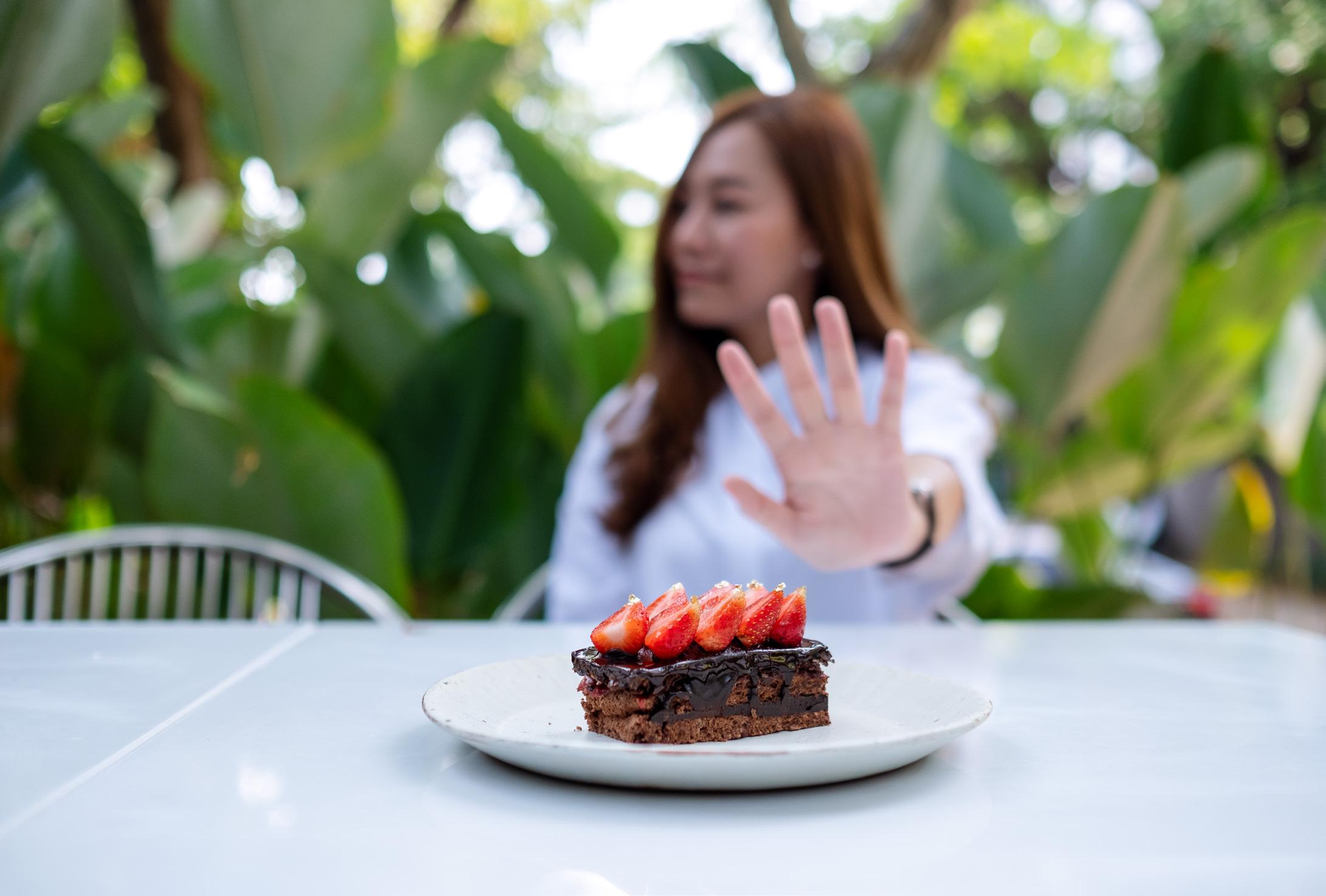
MEET THE COELIAC NEW ZEALAND BOARD
UR 50TH Annual General Meeting is coming up in June, which is quite a milestone for our organisation. Eight of our existing board members discuss below why they put their hands up to be part of the Coeliac New Zealand Board, the governance team and what they get out of the role.
Max Smitheram
I joined the Coeliac New Zealand Board to contribute to my professional skills as a policy analyst. I think that it is very important to have a national advocacy body to work on behalf of and to support people with coeliac disease to be able to live healthy lives. This is my second period of service on the Board. It is very rewarding to collaborate with others on the Board and with Coeliac New Zealand members and, as a community of interest, to achieve inclusive and meaningful outcomes. The Board governance role is well supported by a professional executive team led by our General Manager Wendy Bremner. I embrace diversity and seek to ensure that the Board has a range of complementary skills, demographics, and New Zealand-wide representation.
Rev’d Richard Aitken
I decided to put my name forward to join the Board after a conversation I had with Max in Invercargill when he was completing a bike ride a couple of years ago. I have always had a desire to do more than simply belong


to an organisation, I like to feel that I can somehow contribute to it. When Danielle, our daughter was diagnosed with coeliac disease almost ten years ago now my wife and I had no idea what it meant. Coeliac New Zealand provided so much useful advice and guidance for us in those formative moments. It was for this reason that I felt compelled to try and give something back to an organisation that had made such a lasting and positive impact on our lives.
Jenny Kuttel
I joined as a member in 1986 and I remember what a difference this made in my transition to being “Gluten free for life”. I have retained my membership over the decades as a form of thanks for that support and assistance and knowing there would be lots more people that also would need the same. Now that I am retired, I have joined the Board to contribute to the ongoing success of the society and the work it is doing for those with coeliac disease, dermatitis herpetiformis or, gluten intolerance. We, the gluten-free community,

still have challenges with improving awareness across many sectors, including the medical profession and the hospitality industry. Although making change can be frustratingly slow, I find it very rewarding when we do achieve progress and know that we are making a difference for those of us who must live without gluten.
Corinne
Cameron
Since 2018, I have taken on the role of Treasurer on the Board, a decision fuelled by my daughter’s coeliac diagnosis just before her fifth birthday and my determination to smooth the journey for future coeliacs. My passion lies in creating a more informed and compassionate environment for those affected by coeliac disease, whether it is at school, work, in social settings, or with family/whānau. Throughout my time on the Board, I have gained a deeper understanding of the stakeholders who impact our coeliac experience, from navigating coeliac diagnostic and treatment pathways to collaborating with support agencies, industry regulators, and the food and beverage sector. This journey has reinforced my belief in being an active part of the solution, which allows me to collaborate with like-minded individuals who share the vision of ensuring that those with coeliac disease can lead healthy lives every day.




Rosie Jerram
Coeliac New Zealand made a large impact on how I was able to bounce back from my coeliac diagnosis as a teenager. I was overwhelmed by the vast quantity of information that existed (as well as misinformation) and needed a single source of truth, which Coeliac New Zealand was able to provide. I have been on the Board since 2018 because I want to support people who are early in their coeliac journey, particularly young adults, and children, to empower themselves with the right information and clear channels for accessing safe food. Gaining governance experience has been a huge bonus and has helped me in my early professional career.
Brett Thorburn
I arrived back in New Zealand from Italy when my coeliac daughter was four years old. Despite being the land of bread and pasta, Italy is far better equipped for catering to coeliacs,


with a well-funded certification programme and a hospitality scene that takes them seriously. I was interested in trying to develop something similar in New Zealand, so was asked to join the Board to provide resource. Dining out is such a fundamental part of socialising, and it is still my personal focus. Although most people do not give food a second thought, seeing how excited and relieved a person with coeliac disease is about dining in a safe environment is quite inspiring.
Gary Peachman
I joined the Board driven by personal connection and professional passion. With my brother-in-law diagnosed with coeliac disease from a young age, I have witnessed first-hand the challenges individuals face in managing this condition. This intimate understanding fuels my commitment to the cause. Furthermore, my work in the disability sector has highlighted the broader issue of health advocacy for marginalised communities. Many struggle to articulate their health needs effectively. By serving on the Coeliac New Zealand Board, I aim to bridge this gap, ensuring that those with coeliac disease, as well as others facing similar challenges, have a strong voice and adequate support.

Kirsty Vercoe
Joining the Board has been hugely rewarding for me. Not only can I support other New Zealanders with coeliac disease, but I have met a bunch of engaged, interesting and committed people who are all striving for better for our members and the wider coeliac population. I have learnt a lot and enjoy contributing to a valuable cause. CL
WANT TO KNOW MORE?
If this is something you are considering, or would like more information, please do not hesitate to contact us to find our more. Email: Wendy Bremner at manager@coeliac.org.nz
I THINK THAT IT IS VERY IMPORTANT TO HAVE A NATIONAL ADVOCACY BODY TO WORK ON BEHALF OF AND TO SUPPORT PEOPLE WITH COELIAC DISEASE TO BE ABLE TO LIVE HEALTHY LIVESMAX SMITHERAM CNZ Board
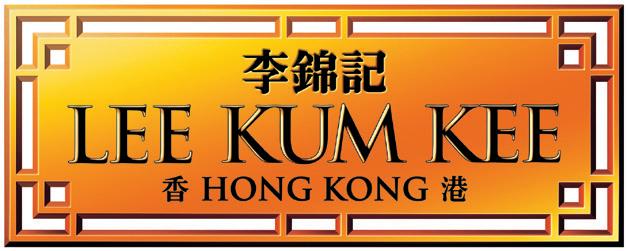
Winter meals sorted
Meal prep has never been easier with Lee Kum Kee’s range of delicious and easy ready sauces.




















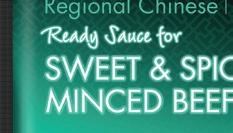

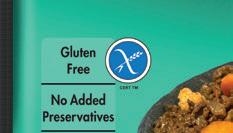





























































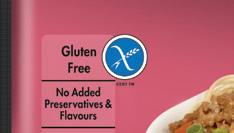



PROUDLY ENDORSED BY COELIAC NEW ZEALAND

























LOOK FOR THE CROSSED GRAIN LOGO
Your easy choice when shopping gluten free


















































When you’re standing in front of a shelf deciding on which GF products to buy, our SHOPPING GUIDE is an easy way to check which brands are suitable for coeliacs, or those with gluten sensitivity.

The food store with something more



HERE ARE loads of delicious gluten-free recipes – including the ones featured here – on our website. Log into the 'members only' section at coeliac.org.nz to access weekly meal plans.



 Buffy Ellen's classic tomato soup
Buffy matchaEllen’schocolate bars
Buffy Ellen’s banana bread Weetbix (with GF Weetbix)
FreshLife ‘s almond croissants
Buffy Ellen’s blueberry &beetroot cheesecake
Buffy Ellen's classic tomato soup
Buffy matchaEllen’schocolate bars
Buffy Ellen’s banana bread Weetbix (with GF Weetbix)
FreshLife ‘s almond croissants
Buffy Ellen’s blueberry &beetroot cheesecake
MID-WEEK MEAL








Coming soon!

Arnott’s Gluten Free Barbecue Shapes will be on supermarkets from July. Made from a carefully crafted gluten-free baking blend, offering the same great taste and quality that you know and love from Arnott’s. arnotts.com
Hands Down Tortillas are 100% natural corn tortillas made fresh in Napier, Te Matau-a-Māui, Hawke’s Bay. These tortillas are made using a traditional technique the Mesoamericans developed that involves soaking the corn kernels in limewater to make the corn more delicious, digestible, and nutritional –then ground through volcanic stones and pressed into tortillas. handsdown.co

Inspired by tradition
Lee Kum Kee Ready Sauce for Hoisin Minced Pork offers sweet and well-balanced flavours; this delicious new ready sauce is perfect with vegetables, legumes, and gluten-free noodles. au-nz.lkk.com

Gluten-free

Introducing the new and improved Vogel’s Gluten-Free range. A fresh new look and an even better taste! vogels.co.nz/bread

Bakels ‘Gold Label’ gluten free banana bread mix is a Kiwi favourite, with its moist and delicious banana flavour you won’t believe it’s gluten free. Simply add, water, oil, and mashed banana. nzbakels.co.nz

Cosmo’s is proud to be able to offer their range of gluten-free products to the coeliac community. Use code WELCOME20 for a special launch offer of 20% discount, available until 30 June 2024. Shop gluten-free products at jayen.co.nz





Bin Inn has released a brand new range of GF baking products

Chipa NZ presents irresistibly cheesy snacks, in five different flavours including a dairy-free and vegan version. Find them in the freezer or order online and use the code CNVMEMBERS to receive a 10% discount! chipa.co.nz



SUPPORTING COELIAC AWARENESS WEEK JUNE 10-16 | 2024
Bakels Gluten-Free Banana Bread Baking Mix is a quality banana bread that does away with Gluten but doesn’t compromise on flavour. Become part of the fan club for this Banana Bread Baking Mix and visit bakels.co.nz for more amazing products.
Banana Bread Endulge in this GF Banana Bread prepared in 30-40 mins and best shared with friends!

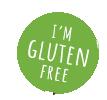

OUR NEW AMBASSADOR

FTER recovering from Graves’ disease 10 years ago using a plant-based whole foods diet, Buffy became passionate about sharing her experience and learnings with others. She began her super successful recipe blog Be Good Organics in 2013, which now has over 180,000 followers across web and social media. Early on she also went back to university to study plantbased nutrition and natural medicine formally and holds a Bachelor of Nutrition
BUFFY ELLEN GILL
BUFFY ELLEN GILL is a nutritionist, naturopath, and author based in Auckland
years, and brand-new twin identical baby boys Caspian and Otto.
A selection of Buffy’s gluten-free recipes can be found on the CNZ website and at: begoodorganics.com
Reminder: always read all the way through the recipe instructions to the Notes section to ensure that you follow the instructions for ingredient swaps to ensure you are using 100% GF ingredients. This is the same for other statements or allergen ingredients.
Buffy’s top tips to boost your energy naturally!
• When consuming a plant-based diet, QUANTITY is important. Often when we omit high calorie food such as heavy dairy and meats, our calories naturally lower, this can lead to fatigue, so eat a higher volume of food and/or more calorically dense foods like nuts, seeds, whole grains, lentils and/or avocados.
and Naturopathy. In addition to Buffy’s blog and social media presence, she runs an online cooking school for people wanting to learn more about plantbased cooking, as well as natural health and medicine. She additionally consults privately with nutrition and naturopathy clients, works with corporates on plantbased recipe development and product marketing, and also regularly presents inperson cooking classes across the country.
Buffy is also the proud mother of four beautiful children – Mila 8 years, Torin 5
• Dehydration leads to fatigue because it impacts the flow of oxygen to the brain and causes your heart to work harder to pump oxygen to all your bodily organs, making you more tired and less alert. By staying hydrated you stay energised.
• Balance blood sugars, WHOLEFOODS, slow release, skip chocolate bar and go for something like a banana.
• Lower stress levels: stress-induced emotions consume huge amounts of energy! Identify things you can do actively to lower your stress and anxious feelings CL
MEDITERRANEAN
FRITTATA
INGREDIENTS
6 large eggs
¼ cup greek yoghurt
¼ packed cup of chopped parsley
1 tbsp chopped chives
¼ tsp salt
Freshly ground black pepper
¼ cup sun-dried tomatoes
drained and chopped
1 tbsp olive oil
1 small red onion diced
1 red capsicum diced
1 courgette diced
1 packed cup of baby spinach
½ cup of crumbled feta
1. Pre heat the oven grill to high.
2. Whisk eggs, yoghurt, parsley, chives salt and pepper until combined. Add sun-dried tomatoes and stir in to egg mixture.
3. Heat olive oil in an oven proof fry pan to a medium heat, add onions, capsicum and courgette. Saute for about 5 minutes until softened.
Add baby spinach and cook until it is wilted. Reduce heat to low/medium. Spread vegetables evenly across pan and sprinkle with half the feta.
4. Pour egg mixture evenly over vegetables and continue cooking until
eggs start to set around the edges (approximately 5-7 minutes).
5. Remove frypan from the stovetop. Sprinkle remaining feta on top of frittata and place under the grill for a few minutes until cooked and slightly puffed up. Remove from grill and serve with a green salad
Serves: 4-6.

INGREDIENTS
250 g butter softened
1 cup raw caster sugar
2 eggs
2 tsp vanilla extract
3 cups gluten free flour
1 ½ tsp baking powder
¼ teaspoon salt
100 g dark chocolate
roughly chopped
1 cup dried apricots
roughly chopped

1. Pre heat oven to 180ºC. Line 2 baking trays with baking paper.
2. Cream butter and sugar until pale and fluffy. Beat in eggs and vanilla extract.
3. Add flour, baking powder and salt, stir until combined.
4. Fold through apricots and chocolate.
5. Place heaped tablespoons of mixture on baking trays leaving room to spread.
6. Bake for 12-15 minutes or until golden. Swap trays half way through baking to ensure even cooking.
7. Remove from oven and allow biscuits to cool for a few minutes before removing to a wire rack to cool completely.
Serves: 35.
REGIONAL CONTACTS
NORTH ISLAND
North of Auckland
Northland
Violet Allen
Auckland Sarah Kennedy
Auckland Kids Club
Renee Jenkins
Thames/Coromandel
Jan Autumn
Mercury Bay
Judi Foster
Waikato
Hamilton
Marina Grantham-Campbell and Ingrid Karsten
South Waikato
Whangamata
Anna Martyn
Bay of Plenty/Tauranga
Tauranga
Catherine Garney
Whakatane
Fiona Hennessey
Hawkes Bay
Napier/Hastings
Hawkes Bay Kids Club
Sam Wemyss
Manawatu/Wanganui
Pip Meads
Palmerston North Kids Club
Jenni Fairey
Wellington Grace Maquire
Wellington Kids Club
Emma Schrader and Indra Prasad
SOUTH ISLAND
Nelson
Toni Chittenden
Marlborough
Leanne Hayes
West Coast
Reefton, Westport, and Karamea
Barry Chalmers
COELIAC NEW ZEALAND STAFF
MEET OUR STAFF




Canterbury
North Canterbury
Shivaun Smith
Christchurch
Emma Prestage
South Canterbury
Joan Simpson and Joy McNulty
Otago
Dunedin
Andrea Wynn-Williams
Dunedin
Dunedin Kids Club
Becky Lazarevic
Wanaka Kids Club
Zoe Huggett
Invercargill/Gore
Wendy Shaw and Becky Maarschalk
Gore Kids Club
Becky Maarschalk
For contact details visit: coeliac.org.nz/ our-staff-volunteers
Email: admin@coeliac.org.nz
to check if there is a volunteer in your area.
(From left)
Karina Ledwos, Health Promotion Manager
Suzanne Aitken, Dietary Education Manager
Fred Tan, Accounts Manager
Wendy Bremner, General Manager
Dana Alexander, Sales and Marketing Manager
A BIG THANKS to our funders – COGS, Lottery Grants Board, Pub Charity, The Lion Foundation, and Pub Charity, and the Aotearoa Gaming Trust – without whose support we would not be able to deliver educational tools to increase diagnosis, or develop resources to support the everyday existence of people living with coeliac disease.

